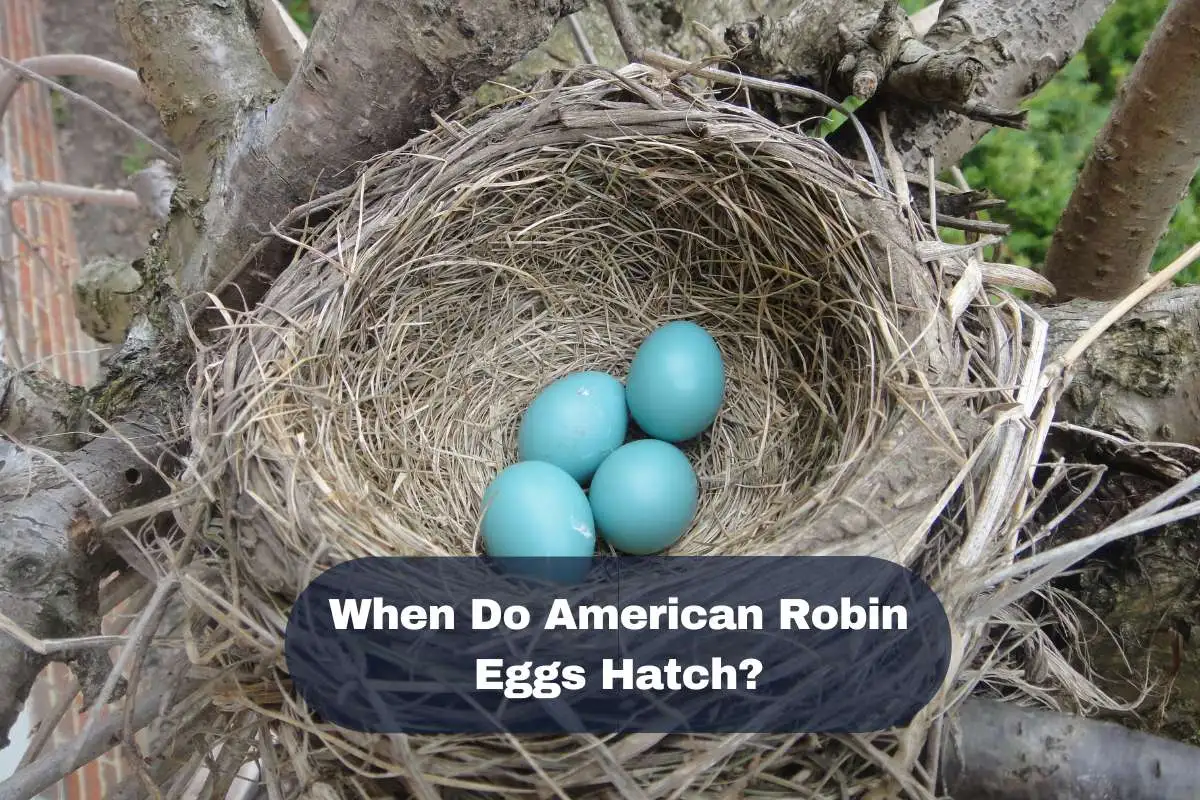As a bird enthusiast, you may be interested in learning more about the breeding habits of American Robins. One aspect of their breeding cycle that may be particularly interesting to you is the hatching of their eggs.
When Do American Robin Eggs Hatch? Eggs of American Robins typically hatch after 12-14 days of incubation, starting when the female sits on them. This process usually takes place in spring and summer—April to July.
Also read my another article about taking care of american robin baby.
Keep reading to know more details about American Robin’s eggs.
What is the typical incubation period for American Robin eggs?
The typical incubation period for American Robin eggs is around 12-14 days. This means that it takes about 12-14 days for the eggs to hatch from the time the female begins sitting on the eggs.
The female American Robin is responsible for incubating the eggs and will begin sitting on them as soon as the final egg is laid.
The incubation period can vary slightly depending on temperature and humidity, but 12-14 days is a general rule of thumb. It is essential information for bird owners and enthusiasts to know, as it can assist in identifying when a nest of eggs in your yard or nearby park may be close to hatching.
Can American Robin eggs hatch earlier or later than the average time frame?
American Robin eggs can hatch earlier or later, depending on temperature and humidity. One can expect American Robin eggs to hatch in 12-14 days if everything is correct; however, if it’s too hot or too cold, they might come out later or earlier than expected.
American robins may have a second or third brood in a breeding season, and the eggs from these later broods may also hatch earlier or later than the eggs from the first brood. As a result, eggs may hatch sooner or later than the average 12-14 days, although this is still considered normal.
You may notice a few signs that tell you when American Robin eggs are about to hatch. One of the most obvious signs is that the eggs will become more transparent as the chicks inside develop. Additionally, you may hear chirping coming from inside the eggs. As the eggs get close to hatching, they begin to pip or make a small hole in their shells. Once you see this happen, hatching is imminent and should happen within a day or two.
Can American Robin eggs hatch successfully in cold weather?
American Robin eggs can hatch in cold temperatures, although it depends on the severity and length of the cold. American robins usually reproduce in the spring and summer months when the weather is warmer, although they may also lay eggs in the fall or early winter. The eggs will hatch if the weather is not too cold and the nest is well-insulated.
However, if the temperatures fall below freezing and remain there for an extended amount, the eggs will perish. If the nest is exposed to winds or the female Robin cannot keep the eggs warm, the eggs may lose its incubating power. If the weather is mild and the nest is well-insulated, the eggs have a better chance of hatching successfully, but this is not guaranteed.
How to tell if a robin egg is alive?
If you want to know if a robin egg is alive, all you have to do is gently candle the egg. This process involves holding the egg to a light source—revealing a network of blood vessels and a small dark area in the center: the developing embryo.
Another method for determining whether a robin egg is alive is gently tapping it with a pencil or similar item. When tapped, a healthy, alive egg makes a dull sound, whereas a dead egg makes a clear, ringing sound. You can also observe the egg if the female is incubating it; if the egg is alive, she will sit on it and keep it warm.
How many eggs does a robin lay?
American robins typically lay a clutch of three to five eggs per breeding season. The female will usually lay one egg daily until the whole clutch is laid. She begins lying in the morning and continues to do so until she has laid all of her eggs.
Robin Eggs Not Hatching?
There are several possible reasons why American Robin eggs may not hatch. Some common reasons include the following:
- Infertile eggs: The eggs may be infertile, meaning they have not been fertilized and will not develop into chicks.
- Cold weather: Cold weather can kill eggs significantly if the temperatures drop below freezing and remain low for an extended period. The eggs can also suffer hypothermia if the female Robin cannot keep them warm.
- Nest disturbance: If you disturb the nest, the female may abandon the eggs or stop incubating them, leading to no hatch.
- Parasites or diseases: Parasites or diseases can infect an egg, leading to it not developing into a chick.
- Predation: Other animals, such as snakes, raccoons, and birds, can steal nest eggs.
Did I Answer Your Query About When Do American Robin Eggs Hatch?
In this article, I’ve discussed the incubation period, hatching signs, the weather’s possible impact, and the number of eggs laid per clutch. But remember that a hatching process can vary depending on specific conditions and circumstances—sometimes eggs won’t hatch for several reasons.
I hope this guide has provided you with valuable information about the hatching process for American Robin eggs.

